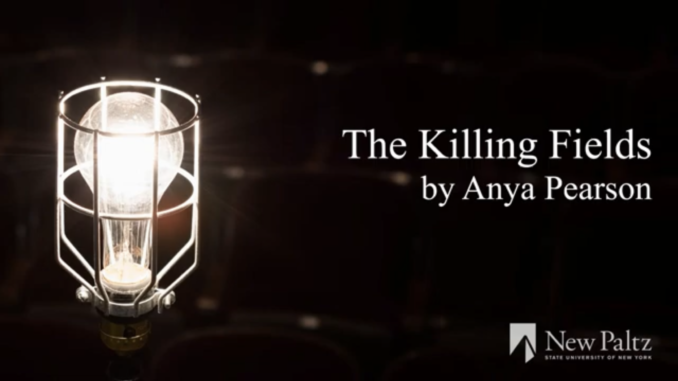
On Feb. 6 “The Killing Fields,” a new play by Anya Pearson, premiered virtually through the theatre department at SUNY New Paltz. Directed by Martine Green-Rogers, the piece is a contemporary re-telling of Agamemnon set in 1980s Oakland during the crack epidemic.
“The Killing Fields,” is a tightly written deep-dive into systemic racism, exploring the jarring villainization of black bodies during President Reagan’s War On Drugs; a villainization that, evidently, society has not yet released. As the tragedy unfolds, the theme of fate vs. faith is posed repeatedly: an oppressive, horrific fate was dealt heavy-handedly unto communities of color by government systems. Do we have enough faith to help enact change?
The play also illuminates Black culture in a nuanced and non stereotypical light. The character Block Boy, boldly played by Jayson Andrews, says “the hood has its own rhythm; its own soundtrack.” With blossoming freestyle rap culture blended with the conspiracy theories of how the drugs were brought into Oakland, this rhythm is intricate and the soundtrack is minor in key.
The Theatre Department at SUNY New Paltz has prioritized “revamping a season that speaks to the events of the summer,” according to director Martine Green-Rogers.
“[The Killing Fields] sheds some light on the role the government had in infiltrating and then creating an epidemic within the black community during this time period . . . ‘How is violence against people of color state sanctioned?’ That is one of the questions we were asking when creating the season,” Green-Rogers said.
Thanks to Pearson’s captivating writing, Green-Roger’s meaningful direction, and the brilliant sound design of Natalie Margaret Houle, Nancy Reagan’s voice in her “Just Say No” campaign is the eerie back-track of multiple scene-change interludes. As the play progresses, the oversimplification of The War On Drugs (and “Just Say No”) becomes angering, creating an impassioned viewing experience riddled with painful twinges of realization about our nation’s history.
Unlike fall semester productions that were best described as ‘amazing-for-zoom-theatre,’ “The Killing Fields” was simply ‘amazing theatre.’ The Theatre Department is proving its mastery rather quickly in this new theatrical format of pandemic-times. A beautiful mural from set-designer Natasha D’Amico, crisp lighting from Dan Salzer and Houle’s perfect sound made a near-complete theatre experience . . . though the absence of crinkling candy wrappers was deafening, of course.
Performance wise, impressive is an understatement when describing the caliber of acting that was channeled tightly through the zoom boxes.
While every actor’s performance reached a high level, Tatiana Saintilus (Clytemnestra) and Moses Oscar (Aegisthus) brought a gut-wrenching honesty and heart-breaking vulnerability to their characters that cannot remain unsaid.
Also outstanding was the ethereal role of Cassandra, the prophet archetype, hauntingly brought to life by Christine Tomer. Tomer’s mysteriousness was chilling and her poetic monologues (often sung a capella) were contained in a singing voice comparable and reminiscent to Billie Eilish.
“The Killing Fields” is an educational necessity and a call to action. It reminds us that the unraveling of oppressive systems must be expedited because, as Clytemnestra states about her community, “life keeps happening to us no matter who’s to blame.” The play reminds us that there is no time to waste; there wasn’t three decades ago and there isn’t now.
If “The Killing Fields” was foreshadowing for the upcoming season, we all have a lot to look forward to.
